国际学术交流英语
- 格式:ppt
- 大小:543.00 KB
- 文档页数:32
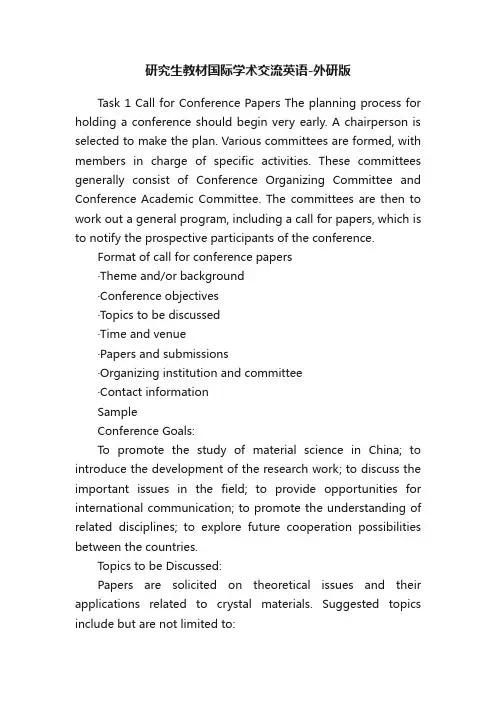
研究生教材国际学术交流英语-外研版Task 1 Call for Conference Papers The planning process for holding a conference should begin very early. A chairperson is selected to make the plan. Various committees are formed, with members in charge of specific activities. These committees generally consist of Conference Organizing Committee and Conference Academic Committee. The committees are then to work out a general program, including a call for papers, which is to notify the prospective participants of the conference.Format of call for conference papers·Theme and/or background·Conference objectives·Topics to be discussed·Time and venue·Papers and submissions·Organizing institution and committee·Contact informationSampleConference Goals:To promote the study of material science in China; to introduce the development of the research work; to discuss the important issues in the field; to provide opportunities for international communication; to promote the understanding of related disciplines; to explore future cooperation possibilities between the countries.Topics to be Discussed:Papers are solicited on theoretical issues and their applications related to crystal materials. Suggested topics include but are not limited to:Papers and Submissions:Authors are invited to submit full papers, up to six pages, with the authors’names and affiliations, complete address (including email, fax and phone number of the corresponding author), before April 10,2006, by email to aa@/doc/91f14474872458fb770bf78a6529647 d2*******.html . The language is Chinese or English. The papers will be reviewed by the program committee based on content, presentation and suitability for the conference. The papers must be in an MS word or Latex format (A4, single space, Songti, 10 points if in Chinese, or Times New Roman, 12 points if in English). More detailed information will be available on the web page: /doc/91f14474872458fb770bf78a6529647d272 83431.html .Useful Expressions and Sentence Patterns1. Call for papers·Papers are being invited for TI 83rd World Conference to be held in Shanghai, May 23-27, 2004.·Titles of proposed papers with a 200-word abstract should be submitted no laterthan May 10, 2006.·The IASTED Secretariat must receive your paper by July 15, 2006.2. Submission·The submitted papers should be original and have not been published elsewhere. ·Best papers will be selected by the Advisory Committee and Program Committee, and the authors a re invited to submit their papers to an international journal. ·For all submissions, please include the following information: title of the paper, name, affiliation, address, phone number, email, andaudiovisual request. ·Abstracts are invited for 20-minute talks followed by 10 minutes of discussion addressing any topic in the areas of Asian environmental protection…3. Format and length·Abstracts should be submitted electronically in an MS Word format and sent by email to the conference secretariat.·Auth ors of accepted papers should send the full text paper in format of PDF or MS Word before September 15, 2006 to aa@/doc/91f14474872458fb770bf78a6529647 d2*******.html with attachment.·All submissions should be in Adobe Acrobat (.pdf), postscript (.ps), or MS Word (.doc) format.·Initial paper submissions should be approximately ten pages.4. Notification of acceptance and refusal·Notification of acceptance will be sent via email by August 1, 2006. ·Receipt of paper submission will be confirm ed by email.·Submissions received after this date will not be given primary consideration. ·Acceptance of the paper will be confirmed by JICC 2006 Program Committee based on content quality of the extended abstract.·Late registration fees or paper submis sions will result in papers being excluded from the conference proceedings.Called to order by the presiding officer主持人致辞roll call点名announcement of quorum宣布大会决议reading of the minutes of the previous meeting宣读前期会议纪要approval of the minutes of the previous meeting通过前期会议纪要related matters相关事宜unfinished business未尽事宜appointments and removal任命及离任nomination and elections提名及选举adjournment休会opening ceremony开幕式keynote speech主题发言forum论坛plenary session全体会议poster session论文展示panel session专题讨论会discussion / question & answer session讨论/提问与回答时间field trip考察活动closing ceremony闭幕式reception/banquet招待晚宴Task 1 Letters of Invitation Before the international conference, the conference host or organizer(s) will send invitation letters to famous scholars and experts in the field and invite them as keynote speakers to the conference. They will also invite other prospective authors to present their new ideas, valuable works, and ongoing research at the conference. These letters are formal letters and therefore should bear all the necessary information about the occasion(s), and express the host’s sincerity and hospitality toward the attendees.在国际会议,会议主持人或组织者()将发送邀请信,著名学者在该领域的专家和邀请他们作为主讲人会议。
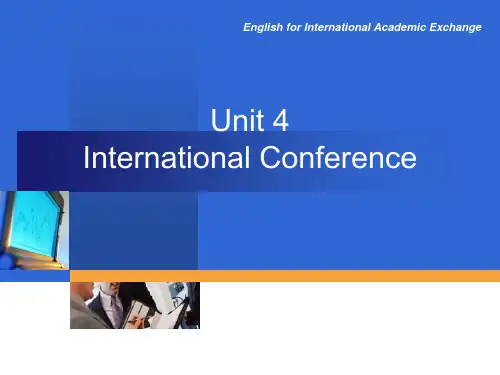

国际学术交流英语教程:研究生英语的新篇章In the rapidly globalizing world, the importance of international academic communication has become increasingly apparent. To this end, the "International Academic Communication English Course: An Innovative Postgraduate English Series" serves as a vital tool for graduate students seeking to engage effectively in cross-cultural academic exchanges. This comprehensive textbook not only equips students with the linguistic skills necessary for international academic communication, but also provides them with a cultural framework to navigate the nuances of global academia.The textbook is divided into several sections, each designed to address a specific aspect of international academic communication. The introductory chapter introduces students to the concept of academic communication and its importance in the global context. It highlights the role of English as the lingua franca of international academia and emphasizes the need forcultural sensitivity and awareness when communicating with scholars from diverse backgrounds.Subsequent chapters delve into the specific skills required for effective academic communication. Topics include writing for international journals, presenting at conferences, and engaging in critical discussions with peers. Each chapter is accompanied by a range of exercises and activities designed to help students apply the knowledge they have learned to real-world scenarios.In addition to its focus on linguistic skills, the textbook also places a strong emphasis on cultural understanding. It explores the differences in academic norms, values, and expectations across cultures, helping students to appreciate the diversity of academic practices worldwide. This cultural awareness is crucial for graduate students who will be navigating the global academic landscape and interacting with scholars from a wide range of backgrounds.The "International Academic Communication English Course" also features a section dedicated to ethicalconsiderations in academic communication. This includes discussions on plagiarism, citation practices, and responsible conduct of research in an international context. This section is designed to prepare students for the rigorous ethical standards expected of them as members of the global academic community.The innovative approach of this textbook lies in its integration of linguistic, cultural, and ethical aspects of international academic communication. By providing a comprehensive and holistic view of academic communication, it equips graduate students with the tools and knowledge they need to engage confidently and effectively in the global academic arena.The "International Academic Communication English Course: An Innovative Postgraduate English Series" is not just a textbook; it is a gateway to the world of global academic communication. It opens up opportunities for graduate students to expand their horizons, engage with scholars from around the globe, and contribute to the advancement of knowledge on an international scale.**国际学术交流英语教程:研究生英语的新篇章**在全球化的世界中,国际学术交流的重要性日益凸显。
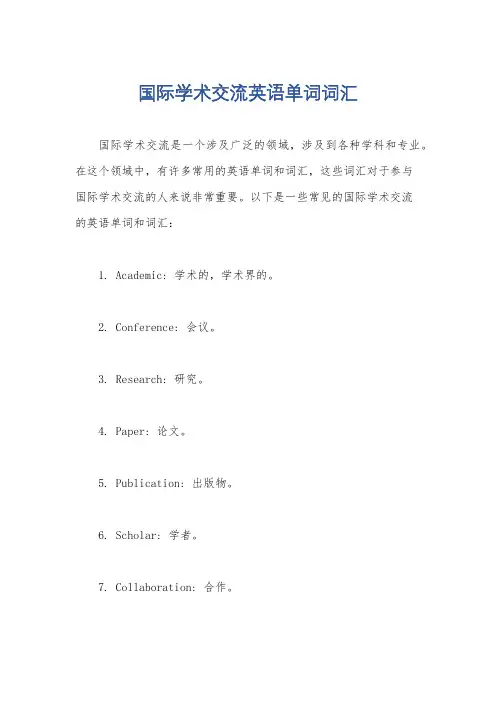
国际学术交流英语单词词汇国际学术交流是一个涉及广泛的领域,涉及到各种学科和专业。
在这个领域中,有许多常用的英语单词和词汇,这些词汇对于参与国际学术交流的人来说非常重要。
以下是一些常见的国际学术交流的英语单词和词汇:1. Academic: 学术的,学术界的。
2. Conference: 会议。
3. Research: 研究。
4. Paper: 论文。
5. Publication: 出版物。
6. Scholar: 学者。
7. Collaboration: 合作。
8. Presentation: 演讲,展示。
9. Abstract: 摘要。
10. Peer review: 同行评议。
11. Citation: 引用。
12. Thesis: 论文,论题。
13. Dissertation: 学位论文。
14. Plagiarism: 抄袭。
15. Academic integrity: 学术诚信。
16. Grant: 资助金,补助金。
17. Symposium: 座谈会,研讨会。
18. Panel: 小组讨论。
19. Academic journal: 学术期刊。
20. Academic writing: 学术写作。
这些词汇涵盖了国际学术交流中的各个方面,包括会议、研究、出版、合作等。
在国际学术交流中,熟悉并正确运用这些词汇是非常重要的,可以帮助人们更好地参与到国际学术交流中去。
同时,这些词汇也反映了国际学术交流的复杂性和多样性,需要人们具备丰富的词汇量和专业知识才能更好地融入这个领域。
希望以上信息对你有所帮助。
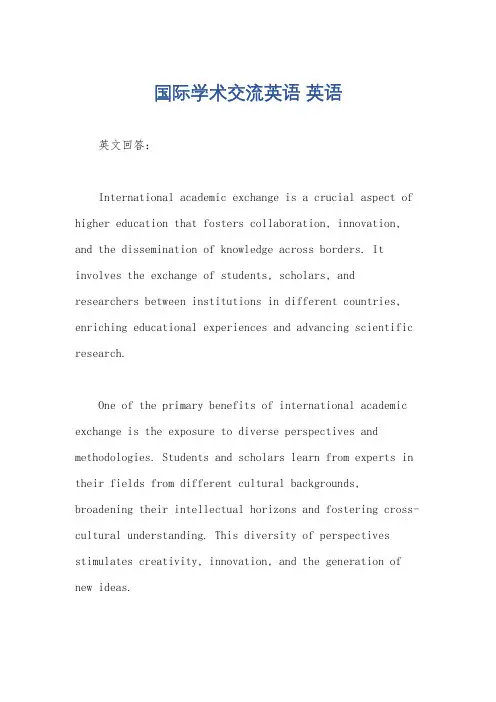
国际学术交流英语英语英文回答:International academic exchange is a crucial aspect of higher education that fosters collaboration, innovation, and the dissemination of knowledge across borders. It involves the exchange of students, scholars, and researchers between institutions in different countries, enriching educational experiences and advancing scientific research.One of the primary benefits of international academic exchange is the exposure to diverse perspectives and methodologies. Students and scholars learn from experts in their fields from different cultural backgrounds, broadening their intellectual horizons and fostering cross-cultural understanding. This diversity of perspectives stimulates creativity, innovation, and the generation of new ideas.International academic exchange also facilitates the transfer of knowledge and skills. Students and researchers gain access to specialized knowledge, cutting-edge research facilities, and advanced technologies through exchange programs. This exposure enhances their academiccapabilities and prepares them for careers in a globalized world.Furthermore, international academic exchange promotes collaboration and networking. Collaborative research projects between institutions in different countries foster interdisciplinary approaches, pooling resources and expertise to address complex global challenges. Networks established through exchange programs facilitate ongoing communication and knowledge sharing, sustaining collaboration beyond the exchange period.Cultural exchange is another significant aspect of international academic exchange. Students and scholars immersed in different cultures develop a deeper understanding of global perspectives, break down stereotypes, and foster empathy for diverse communities.This cultural exchange enriches their personal and professional lives, preparing them to thrive in an increasingly interconnected world.In conclusion, international academic exchange plays a vital role in advancing higher education and research. It promotes intellectual growth, facilitates knowledge transfer, fosters collaboration, and enhances cross-cultural understanding. By embracing international exchange, institutions create opportunities for students, scholars, and researchers to shape a more interconnected and knowledge-driven global community.中文回答:国际学术交流是高等教育中至关重要的一环,它促进了跨境合作、创新和知识传播。
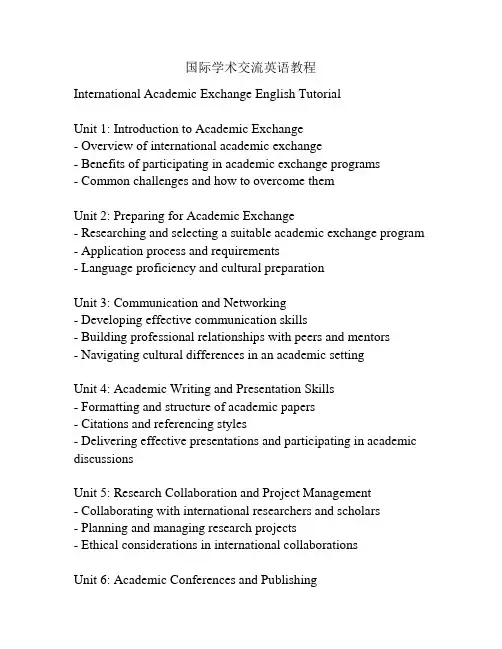
国际学术交流英语教程International Academic Exchange English TutorialUnit 1: Introduction to Academic Exchange- Overview of international academic exchange- Benefits of participating in academic exchange programs- Common challenges and how to overcome themUnit 2: Preparing for Academic Exchange- Researching and selecting a suitable academic exchange program - Application process and requirements- Language proficiency and cultural preparationUnit 3: Communication and Networking- Developing effective communication skills- Building professional relationships with peers and mentors- Navigating cultural differences in an academic settingUnit 4: Academic Writing and Presentation Skills- Formatting and structure of academic papers- Citations and referencing styles- Delivering effective presentations and participating in academic discussionsUnit 5: Research Collaboration and Project Management- Collaborating with international researchers and scholars- Planning and managing research projects- Ethical considerations in international collaborationsUnit 6: Academic Conferences and Publishing- Participating in academic conferences and symposiums- Submitting research papers for publication- Peer review process and dealing with rejectionUnit 7: Funding and Scholarships for Academic Exchange- Exploring funding opportunities for academic exchange- Scholarship applications and writing effective grant proposals- Budgeting and financial planning for international academic exchangeUnit 8: Cultural Immersion and Personal Growth- Embracing and learning from a different culture- Overcoming culture shock and homesickness- Personal growth and development through international academic exchangeUnit 9: Post-Academic Exchange Reflection and Integration- Reflection on the academic exchange experience- Integrating acquired knowledge and skills into future endeavors - Maintaining international connections and opportunities for future collaborationsUnit 10: Case Studies and Success Stories- Case studies of successful academic exchange experiences- Interviews with international students and scholars- Inspirational stories of how academic exchange has impacted their careers and livesNote: This is just a suggested outline for a potential international academic exchange English tutorial. The actual content andstructure can vary depending on the specific focus and goals of the tutorial.。
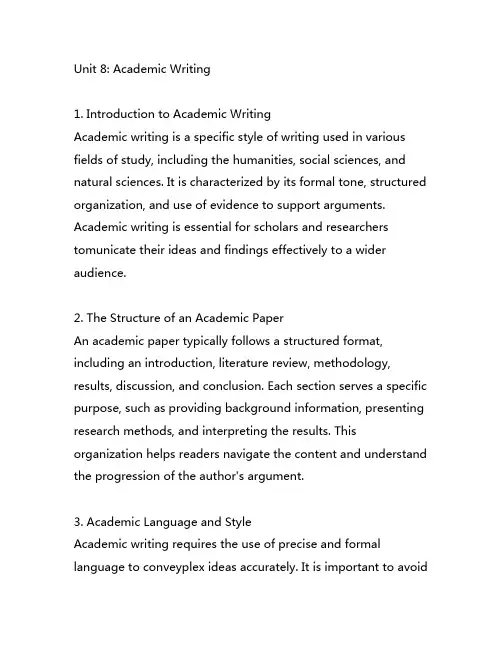
Unit 8: Academic Writing1. Introduction to Academic WritingAcademic writing is a specific style of writing used in various fields of study, including the humanities, social sciences, and natural sciences. It is characterized by its formal tone, structured organization, and use of evidence to support arguments. Academic writing is essential for scholars and researchers tomunicate their ideas and findings effectively to a wider audience.2. The Structure of an Academic PaperAn academic paper typically follows a structured format, including an introduction, literature review, methodology, results, discussion, and conclusion. Each section serves a specific purpose, such as providing background information, presenting research methods, and interpreting the results. This organization helps readers navigate the content and understand the progression of the author's argument.3. Academic Language and StyleAcademic writing requires the use of precise and formal language to conveyplex ideas accurately. It is important to avoidcolloquial expressions, slang, and contractionsmonly used in informal writing. Additionally, writers should adhere to the conventions of academic style, such as using appropriate vocabulary, avoiding personal pronouns, and employing formal grammar and punctuation.4. Citations and ReferencingCiting sources accurately is a crucial aspect of academic writing. Writers must acknowledge the ideas and research of others by providing citations within the text and creating aprehensive list of references at the end of the paper. Different disciplines may use specific citation styles, such as APA, MLA, or Chicago, so it is essential to follow the guidelines of the relevant academicmunity.5. Critical Thinking and AnalysisAcademic writing requires a high level of critical thinking and analysis. Writers must evaluate existing research, identify gapsin knowledge, and presentpelling arguments based on evidence. This process involves synthesizing information from multiple sources, evaluating the strengths and weaknesses of different perspectives, and developing original insights to contribute to the scholarly discourse.6. Writing StrategiesEffective academic writing involves several strategies to convey information clearly and persuasively. These may include outlining the m本人n points, using transitional phrases to connect ideas, structuring paragraphs logically, and revising the draft to refine the argument and language. Additionally, writers should pay attention to coherence and cohesion to ensure that the paper is well-organized and easy to follow.7. Academic Writing in Different DisciplinesWhile academic writing sharesmon principles across disciplines, there are also specific conventions and expectations within each field of study. For example, the writing style in the humanities may differ from that in the natural sciences, and the types of evidence used in social sciences may vary from those in engineering or medicine. Writers should familiarize themselves with the norms of their particular discipline to produce effective academic papers.8. ConclusionIn conclusion, academic writing is a fundamental skill for scholars and researchers tomunicate their ideas and contributeto the advancement of knowledge. By understanding the principles of academic writing, mastering the structure and language of academic papers, and honing critical thinking and analysis, writers can produce impactful and influential scholarly work.。
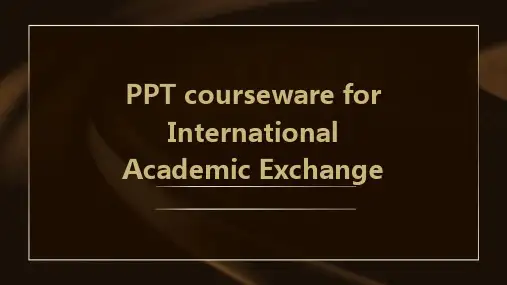
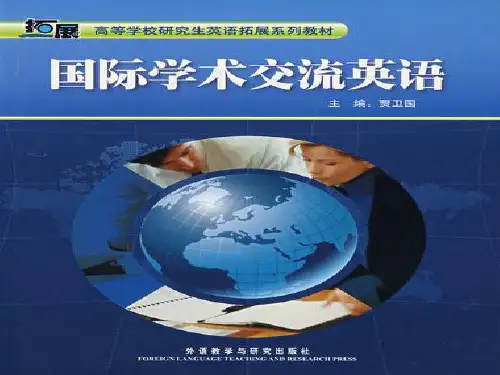
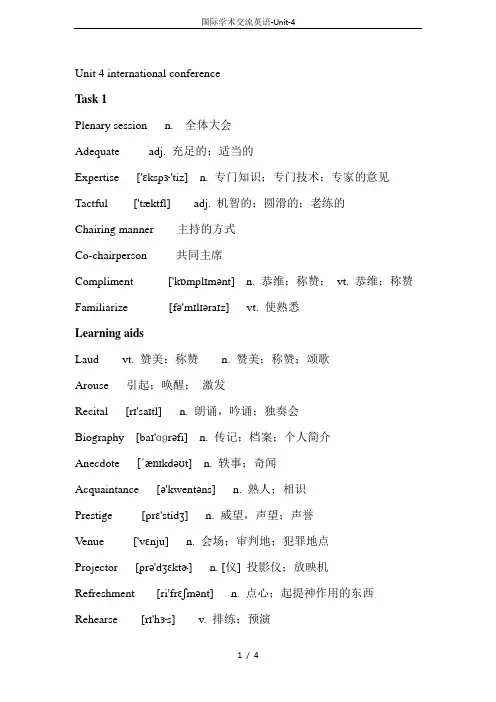
Unit 4 international conferenceTask 1Plenary session n. 全体大会Adequate adj. 充足的;适当的Expertise ['ɛkspɝ'tiz] n. 专门知识;专门技术;专家的意见Tactful ['tæktfl] adj. 机智的;圆滑的;老练的Chairing manner 主持的方式Co-chairperson 共同主席Compliment ['kɒmplɪmənt] n. 恭维;称赞;vt. 恭维;称赞Familiarize [fə'mɪlɪəraɪz] vt. 使熟悉Learning aidsLaud vt. 赞美;称赞n. 赞美;称赞;颂歌Arouse 引起;唤醒;激发Recital [rɪ'saɪtl] n. 朗诵,吟诵;独奏会Biography [baɪ'ɑɡrəfi] n. 传记;档案;个人简介Anecdote [ˈænɪkdəʊt] n. 轶事;奇闻Acquaintance [ə'kwentəns] n. 熟人;相识Prestige [prɛ'stidʒ] n. 威望,声望;声誉Venue ['vɛnju] n. 会场;审判地;犯罪地点Projector [prə'dʒɛktɚ] n. [仪] 投影仪;放映机Refreshment [ri'frɛʃmənt] n. 点心;起提神作用的东西Rehearse [rɪ'hɝs] v. 排练;预演Podium [ˈpəʊdiəm] n. 乐队指挥台;矮墙Erect [ɪ'rɛkt] vt. 使竖立;建造;安装adj. 竖立的;笔直的;Announce [ə'naʊns] vt. 宣布;述说;预示;播报Allotted [ə'lɒtɪd] adj. 专款的;拨出的Decisive [dɪ'saɪsɪv] adj. 决定性的;果断的,坚定的Courteous ['kɝtɪəs] adj. 有礼貌的;谦恭的Impartially [im'pa:ʃəli] adv. 公平地;无私地Adjourn [ə'dʒɝn] vi. 休会;延期;换地方vt. 推迟Privilege ['prɪvlɪdʒ] n. 特权;优待;基本权利Symposium [sɪmˈpəʊziəm] n. 讨论会,座谈会;专题论文集Extraordinarily [ɪk'strɔdɪn(ə)rəlɪ] adv. 非常;格外地Assemble [ə'sɛmbl] v. 集合,聚集;装配Previously ['priviəsli] adv. 以前;预先Mentor ['mɛn'tɔr] n. 指导者,良师益友Toastmaster ['tostmæstɚ] n. 宴会主持人,主持人Millionaire [,mɪljə'nɛr] n. 百万富翁;大富豪Enlightening [ɪn'laɪtənɪŋ]adj. 使人领悟的;有启发作用的Task 2Backbone ['bækbəʊn] n. 支柱;主干网Propagate ['prɒpəɡeɪt] v. 传播;传送;繁殖;宣传Learning aidsConciseness [kən'saɪsnɪs] n. 简明,简洁;切除Digress [daɪ'ɡrɛs] vi. 离题;走向岔道Irrelevance [ɪ'rɛləvəns] n. 离题;枝节问题;不相关的事物Transitional [træn'zɪʃənl] adj. 变迁的;过渡期的Organic [ɔr'gænɪk] adj. [有化] 有机的;组织的Monotone [ˈmɔnəˌtəʊn] n. 单调;单音调adj. 单调的Alert [ə'lɝt] vt. 警告;使警觉,使意识到adj. 警惕的,警觉的;留心的Syllable ['sɪləbl]n. 音节Enunciate [ɪ'nʌnsɪet] v. 发音;阐明;宣布Enthusiastically [in,θju:zi'æstikəli] adv. 热心地;满腔热情地Ambivalent [æm'bɪvələnt] adj. 矛盾的;好恶相克的Slide n. 滑动;幻灯片Gracious ['ɡreʃəs] adj. 亲切的;高尚的;和蔼的;雅致的Gratitude ['ɡrætɪtud] n. 感谢的心情Unambiguously 清晰地Antibiotic [,æntɪbaɪ'ɑtɪk] adj. 抗生的;抗菌的Surgical ['sɝdʒɪkl] adj. 外科的;手术上的Coronary ['kɔrənɛri] adj. 冠的;冠状的;花冠的Hepatitis [heipə'taɪtɪs] n. 肝炎Expedite ['ɛkspədaɪt] vt. 加快;促进;发出Accelerate [ək'sɛləret] v. 加速;促进;增加Integration [ɪntɪ'greɪʃ(ə)n] n. 集成;综合Conscientious ['kɑnʃɪ'ɛnʃəs] adj. 认真的;尽责的;本着良心的Ideology [,aɪdɪ'ɒlədʒɪ; ɪd-] n. 意识形态;思想意识;观念学Embed [ɪm'bɛd] vt. 栽种;使嵌入,Unscrupulous [ʌn'skrupjələs] adj. 肆无忌惮的;寡廉鲜耻的Destructive [dɪ'strʌktɪv] adj. 破坏的;毁灭性的Task 3Retention [rɪ'tɛnʃən] n. 保留;扣留,滞留;Confirmation [,kɑnfɚ'meʃən] n. 确认;证实;证明;批准Learning aidsProceed [pro'sid] vi. 开始;继续进行;发生Illuminate [ɪ'lumɪnet] vt. 阐明,说明Desirable [dɪ'zaɪərəbl] adj. 令人满意的;值得要的Elaborate [ɪ'læbəret] adj. 精心制作的;详尽的;煞费苦心的Ergonomics ['ɝgə'nɑmɪks] n. 工效学;人类工程学Panel ['pænl]n. 仪表板;嵌板;座谈小组,Concur [kən'kɝ] vi. 同意;一致;互助。

Good morning/afternoon/evening! It is a great honor and pleasure for me to stand here before such a distinguished audience at this international academic exchange conference. Today, I would like to share my thoughts on the importance of international academic collaboration and its impact on global progress.Firstly, let me extend my warmest welcome to all the participants from various corners of the world. Your presence here today is a testament to the increasing importance of international academic exchange and cooperation. In this rapidly evolving globalized world, the need for collaboration between scholars and researchers from different countries has never been more crucial.The primary reason for the significance of international academic collaboration is the exchange of knowledge and ideas. In today's interconnected world, no single country or region possesses all the necessary expertise and resources to tackle the complex challenges we face. By collaborating with our counterparts from different countries, we can pool our collective wisdom and expertise to address these challenges more effectively.One of the most significant benefits of international academic collaboration is the acceleration of research and development. When scholars from different disciplines and cultures come together, they bring diverse perspectives and methodologies to the table. Thisdiversity fosters innovation and creativity, leading to groundbreaking discoveries and advancements in various fields. For instance, the collaboration between Western and Asian scientists in the field of genomics has led to significant breakthroughs in understanding human genetics and treating diseases.Furthermore, international academic collaboration helps to bridge the knowledge gap between developed and developing countries. Developing nations often face limitations in terms of funding, infrastructure, and access to advanced research facilities. Through partnerships with international academic institutions, these countries can gain access to the latest technologies, expertise, and resources, enabling them toleapfrog certain stages of development and contribute meaningfully to global progress.In addition to research and development, international academic collaboration plays a vital role in promoting cultural understanding and fostering global citizenship. When scholars from different cultures work together, they not only exchange academic knowledge but also learn about each other's customs, traditions, and values. This cultural exchange fosters mutual respect and appreciation, which is essential for building a peaceful and harmonious world.To ensure the success of international academic collaboration, it is essential to establish robust platforms and frameworks for cooperation. Some key strategies include:1. Strengthening academic networks: By fostering strong relationships between academic institutions worldwide, we can create a more interconnected global academic community. This can be achieved through joint research projects, exchange programs, and international conferences.2. Promoting interdisciplinary research: Encouraging scholars from different disciplines to collaborate can lead to more comprehensive and innovative solutions to complex problems. Interdisciplinary research can break down silos and encourage a holistic approach to problem-solving.3. Facilitating access to resources: Ensuring that developing countries have access to the necessary resources, including funding, research facilities, and training opportunities, is crucial for promoting international academic collaboration.4. Encouraging policy dialogue: Governments and policymakers should engage in discussions on how to support and facilitate international academic collaboration. This can involve providing financial incentives, simplifying visa procedures, and promoting open access to research findings.In conclusion, international academic collaboration is a powerful tool for advancing knowledge, fostering innovation, and promoting globalprogress. By pooling our collective resources, expertise, and perspectives, we can address the challenges of the 21st century more effectively and build a better future for all. I am confident that this conference will serve as a catalyst for further international academic collaboration and contribute to the betterment of our world.Thank you for your attention, and I would be happy to answer any questions you may have.[Your Name]。
国际学术交流英语西安交大**International Academic Exchange English Symposium at Xi'an Jiaotong University**English Content:As a renowned institution of higher learning, Xi'an Jiaotong University (XJTU) has always been at the forefront of promoting international academic exchanges. Recently, the university hosted an International Academic Exchange English Symposium, aiming to enhance the Englishproficiency of its students and faculty members involved in cross-cultural collaborations.The symposium kicked off with a welcoming address by the university's Vice President, who emphasized the importance of language proficiency in international academic communication. He pointed out that English, as a global language, plays a pivotal role in bridging cultural gaps and facilitating the exchange of ideas and knowledge. Following the opening ceremony, a series of workshops were conducted by experienced language instructors and international academic experts. These workshops covered awide range of topics, including effective communication strategies, cultural awareness in academic settings, and the nuances of academic writing in English. Participants were encouraged to actively participate in discussions and interactive exercises designed to improve their language skills.One of the highlights of the symposium was a panel discussion on the challenges and opportunities of international academic communication. Panelists, who consisted of leading academics from diverse backgrounds, shared their insights and experiences in navigating the nuances of academic discourse across cultures. They discussed the importance of maintaining a positive, respectful tone in written and verbal communication, and emphasized the role of continuous learning and adaptationin enhancing cross-cultural understanding.In addition to the workshops and panel discussions, the symposium also featured a mock academic presentation session. This session provided participants with an opportunity to practice their presentation skills in a simulated international academic conference setting.Participants were evaluated on their language fluency,clarity of ideas, and effectiveness in engaging with their audience.The event concluded with a closing ceremony, where the organizers presented certificates of completion to the participants. The Vice President concluded the ceremony by thanking all the participants, instructors, and sponsorsfor their valuable contributions to the symposium's success. He emphasized that the university would continue toprioritize international academic exchanges and language proficiency training in its efforts to cultivate globally competent students and faculty members.The International Academic Exchange English Symposiumat Xi'an Jiaotong University was a resounding success. It not only improved the English proficiency of itsparticipants but also fostered a deeper understanding of international academic norms and practices. The event marked a significant milestone in the university's ongoing commitment to promoting global academic collaboration and cultural exchange.中文内容:西安交通大学作为一所著名的高等学府,一直致力于推动国际学术交流的发展。
研究生英语国际学术交流Graduate English International Academic ExchangeGraduate students often engage in international academic exchange to enhance their research and broaden their perspectives. International academic exchange can take various forms, including attending conferences, participating in research collaborations, and studying abroad.One popular form of international academic exchange for graduate students is attending conferences. Conferences provide a platform for researchers from different countries to share their findings and discuss their work. By attending conferences, graduate students can learn about the latest developments in their field, receive feedback on their own research, and establish connections with scholars from around the world.Another way for graduate students to engage in international academic exchange is through research collaborations. Collaborative research projects enable graduate students to work with scholars from different countries, bringing together unique perspectives and expertise. These collaborations can result in joint publications, presentations, and the exchange of knowledge and skills.Studying abroad is another avenue for graduate students to participate in international academic exchange. By pursuing a portion of their studies in a foreign country, students have the opportunity to experience different academic systems, learn from renowned scholars, and engage in cross-cultural learning. Studying abroad also enables students to network with international peers and build relationships that can lead to future collaborations and research opportunities.In addition to the academic benefits, international academic exchange offers personal and professional growth opportunities for graduate students. Experiencing different cultures and working with scholars from diverse backgrounds can enhance their intercultural communication skills, adaptability, and problem-solving abilities. These qualities are highly valued in today's globalized world and can greatly benefit their future careers.To engage in international academic exchange, graduate students can explore various resources such as funding opportunities, international research programs, and exchange programs offered by their universities or professional organizations. It is important to plan ahead and carefully consider the goals and objectives of the exchange to make the most ofthe experience.In conclusion, international academic exchange plays a crucial role in the development of graduate students. By attending conferences, participating in research collaborations, and studying abroad, graduate students can expand their knowledge, broaden their perspectives, and establish connections with scholars from around the world. These experiences not only contribute to their academic growth but also enhance their personal and professional development.。
International Academic Exchange in EnglishWith the globalization and rapid development of science and technology, the significance of international academic exchange in English has become increasingly prominent. As a bridge of communication, it enables scholars from different countries to share their knowledge and expertise, deepening mutual understanding and promoting academic progress.Firstly, international academic exchange in English has strengthened academic cooperation and innovation. In the era of knowledge economy, scientific research and innovation have become an essential driving force of economic and social development. By sharing ideas and collaborating with international scholars, researchers can be inspired by fresh perspectives and achieve breakthroughs in their own fields.Secondly, international academic exchange in English has enhanced cultural exchange and understanding. As a language used worldwide, English allows people from different cultural backgrounds to interact and communicate freely. Academic exchange serves as a platform for scholars to learn about different cultures and lifestyles, promoting mutual understanding and respect. This creates opportunities for future cooperation and collaboration not only in academia but also in various other fields.Thirdly, international academic exchange in English has expanded academic horizons and opportunities. International academic conferences, forums, and workshops provide a platform for scholars to showcase their research, learn from the latest findings, and network with other professionals in their fields. This facilitates academic exchanges, opens up more opportunities, and raises the standards of research.Fourthly, international academic exchange in English has contributed to the growth of the international academic community. By sharing their findings, experiences and expertise, scholars take an active part in transforming knowledge and ideas into practical solutions that address global challenges like climate change, energy, health, and poverty reduction.In conclusion, international academic exchange in English is a vital aspect of academic work. It facilitates knowledge sharing and innovation, enhances cultural understanding, and broadens academic horizons. As the world becomes more interconnected, international academic exchange in English will increasingly play a critical role in promoting academic progress, cultural understanding, and cooperation among countries worldwide.。